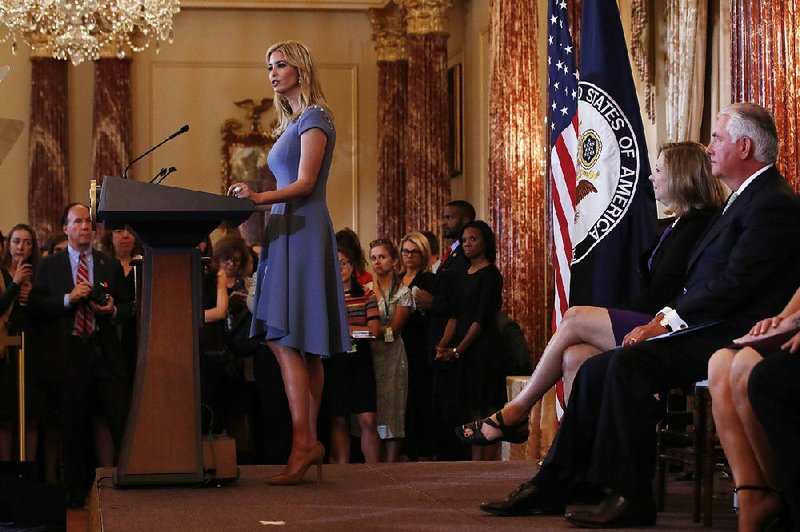WASHINGTON -- The United States asserted Tuesday that Burma is no longer one of the world's worst offenders on human trafficking, while removing both Burma and Iraq from a list of countries that use child soldiers.
In its annual report on human trafficking, the State Department demoted China to the lowest ranking over its trafficking record, putting it in the same category as North Korea, Zimbabwe and Syria. Afghanistan was recognized for taking steps to curb trafficking, while Iraq was seen as making insufficient progress on that issue.
Ivanka Trump, a senior White House adviser and daughter of President Donald Trump, said ending human trafficking is in both the moral and strategic interests of the U.S., describing the effort as a "major foreign policy priority" for the administration.
"As a mother, this is much more than a policy priority," she said at a ceremony to unveil the report. "It is a clarion call into action in defense of the vulnerable and the exploited."
Secretary of State Rex Tillerson said the roughly 20 million victims of human trafficking globally illustrate how much more work must be done.
"Regrettably, our challenge is enormous," Tillerson said. "Human trafficking is becoming more nuanced and more difficult to identify. Much of these activities are going underground, and they're going online."
Also known as Myanmar, Burma was promoted for its efforts against recruitment of child soldiers and its first prosecution of government officials under a human trafficking law. The Southeast Asia nation had been demoted to the lowest tier last year, shortly after it shifted to civilian government, ending decades of oppressive military rule.
Burma's elevation is a boost for Aung San Suu Kyi's administration, which is facing growing criticism from human-rights groups. The political transition in the Southeast Asian country has been a bumpy one as it wrestles with ethnic conflict and deep-seated discrimination against its minority Rohingya Muslims.
The demotion of China was a particular surprise this year, marking the first major, public rebuke of China's human-rights record by the Trump administration, which has generally avoided direct, public criticism of China and other world powers on rights issues. The Trump administration has been seeking China's help to pressure North Korea to give up its nuclear program, and Tillerson said Tuesday that China's failure to crack down on forced labor from North Korea was among the reasons it was downgraded.
In the report, the U.S. said that not only was China not meeting minimum standards to stop trafficking, it also was "not making significant efforts to do so." The report also said there were indications that China's government was still complicit in forced labor, including in some drug rehabilitation centers. The U.S. said China's efforts to prosecute traffickers had also fallen.
Ahead of the report, China criticized the U.S. for speaking "irresponsibly."
Foreign Ministry spokesman Lu Kang said China strongly opposes the U.S. using its domestic laws to attack another country's record.
"China's government's commitment to fighting human trafficking has been resolute and our results have been obvious for everyone to see," he said, adding that China is willing to work with other countries "on the basis of mutual respect" to combat global human trafficking.
Burma and Iraq were taken off the blacklist of foreign governments identified as having child soldiers, a move that Human Rights Watch said was premature in the case of Burma and undermines U.S. credibility in ending the use of children in warfare. The group said the United Nations documented child recruitment by Burma's armed forces in 2016.
Information for this article was contributed by Matthew Pennington and staff members of The Associated Press.
A Section on 06/28/2017

